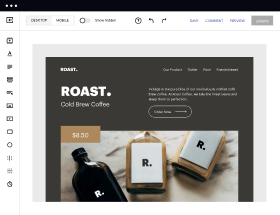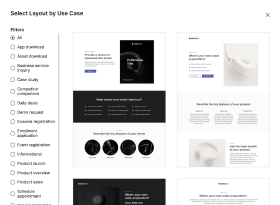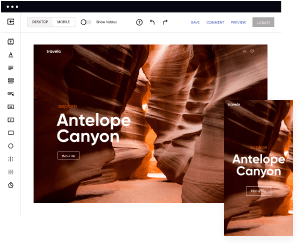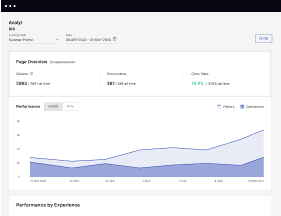Get flawless functionality on iOS by using our optimized countdown timer page template
Customize your iOS-optimized countdown timer page template for a flawless user experience. Get started now!

Easy to build without coding
With the intuitive drag-and-drop builder, anyone on your team can create high-converting pages without any knowledge of code or design. Make enhancements to your landing page with custom widgets using Javascript, HTML/CSS, or third-party scripts.
Multiple layouts for any industry and goal
Select from 500+ landing page layouts built to boost conversions across industry-specific scenarios. Customize them by adjusting fonts, adding images, and generating on-brand content with the AI assistant. Quickly scale with Instablocks® and Global Blocks that you can save, reuse, and update globally.
Loads fast and looks polished on any device
Every template is responsive, which means they present professionally on any device and load blazingly fast with our Thor Render Engine. You can also power them up with Google AMP technology to deliver an unparalleled mobile experience and drive higher conversions.
Robust analytics & experimentation
Get real-time updates and reporting across all your devices, showing the number of visitors, conversions, cost-per-visitor, and cost-per-lead. Launch AI-powered experiments, run A/B tests, and use heatmaps to analyze user behavior, then optimize your landing page to maximize conversions.
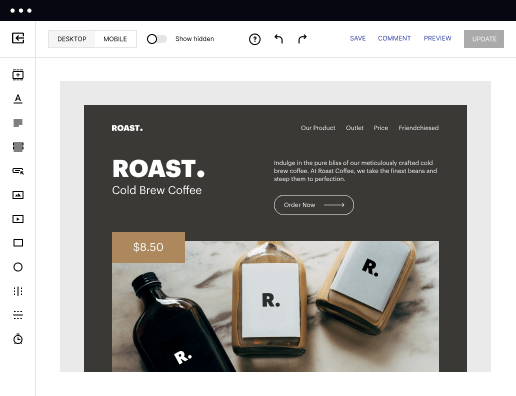
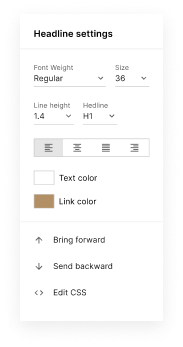
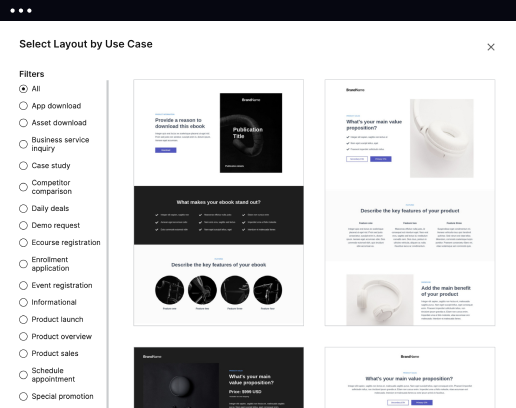
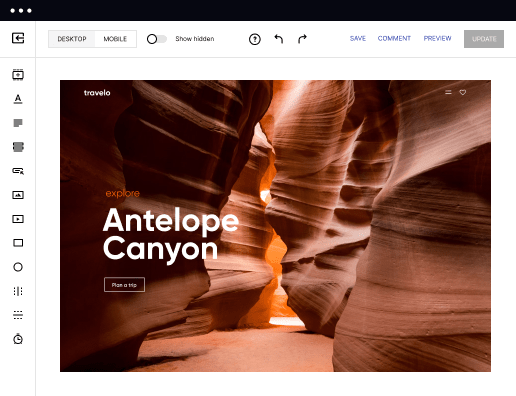
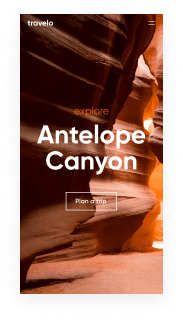
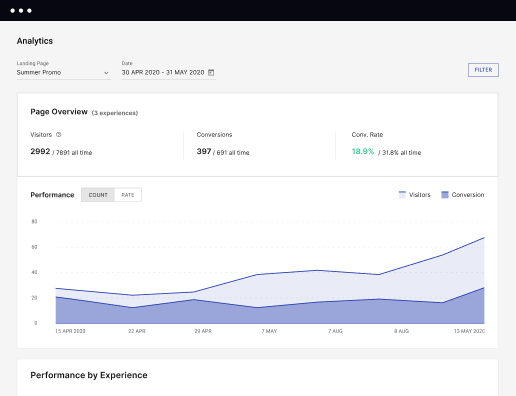
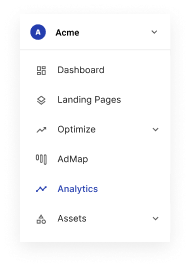
Easy to build without coding
With the intuitive drag-and-drop builder, anyone on your team can create high-converting pages without any knowledge of code or design. Make enhancements to your landing page with custom widgets using Javascript, HTML/CSS, or third-party scripts.
Multiple layouts for any industry and goal
Select from 500+ landing page layouts built to boost conversions across industry-specific scenarios. Customize them by adjusting fonts, adding images, and generating on-brand content with the AI assistant. Quickly scale with Instablocks® and Global Blocks that you can save, reuse, and update globally.
Loads fast and looks polished on any device
Every template is responsive, which means they present professionally on any device and load blazingly fast with our Thor Render Engine. You can also power them up with Google AMP technology to deliver an unparalleled mobile experience and drive higher conversions.
Robust analytics & experimentation
Get real-time updates and reporting across all your devices, showing the number of visitors, conversions, cost-per-visitor, and cost-per-lead. Launch AI-powered experiments, run A/B tests, and use heatmaps to analyze user behavior, then optimize your landing page to maximize conversions.
All the features you need to build lead-generating landing pages
Explore more featuresLearn how to build top-performing landing pages for any goal
FAQs
Leading the way in building high-performing landing pages





A countdown timer page template optimized for iOS
Creating a countdown timer page optimized for iOS is essential for engaging mobile users and boosting conversions. Instapage offers an extensive library of customizable templates that cater specifically to iOS devices. This guide will walk you through the process of utilizing these powerful resources effectively.
Understanding the countdown timer page template features
The countdown timer page template is specifically designed to create urgency among potential customers. Key features include:
- Responsive design: Ensures your countdown timer looks great on any iOS device, maintaining user engagement.
- Customizable timer settings: Adjust the length, style, and messaging of your countdown to align with campaign goals.
- Integration capabilities: Seamlessly connects with lead generation tools for capturing user data.
Step 1: Choose the right template
Start by selecting a countdown timer template from Instapage’s library. This allows for your brand's aesthetic to shine while also being optimized specifically for mobile use.
Step 2: Customize your countdown timer settings
Next, personalize your countdown timer. Here’s how:
- Select the duration: Decide on the time frame for your campaign, be it a limited-time offer or an upcoming event.
- Pick a visual style: Choose from various customizable designs that match your branding.
- Add an enticing call-to-action message: Encourage visitors to act fast before time runs out.
Step 3: Analyze and optimize for future campaigns
After your page is live, utilize Instapage’s analytics tools to track performance. Consider these aspects:
- Conversion rates: Measure how effectively your countdown timer drives user engagement.
- User feedback: Collect insights about user experience and potential improvements.
- A/B testing: Trial different countdown styles and messages to see what resonates best.
In summary, using Instapage’s countdown timer page template, you can create compelling urgency and drive conversions effectively.
Ready to take your marketing strategy to the next level? Explore Instapage today and find the perfect countdown timer template for your iOS campaigns!
People also ask about Countdown timer page template optimized for iOS
Countdown timer page template optimized for iOS
Understanding the countdown timer concept
A countdown timer is a digital tool that counts down the time remaining to a specific event or deadline. It creates a sense of urgency by visually displaying the time left, making it a powerful component in various marketing strategies. The purpose of a countdown timer is not just to inform users about the time left but to energize them into taking action, be it purchasing a product, signing up for a newsletter, or engaging with content.
Creating urgency in marketing campaigns is essential for driving conversions. The psychology behind urgency is straightforward: the limited availability or a ticking clock incentivizes potential customers to act quickly out of fear of missing out. This makes countdown timers an effective tool for campaigns, flash sales, limited-time offers, and event promotions.
Types of countdown timers
Countdown timers can be broadly categorized into static and dynamic types. Static timers show a fixed countdown that does not alter based on user interaction. On the other hand, dynamic timers may change based on user actions or engagement, often resetting for each visitor or reflecting that individual’s past interactions.
Moreover, countdown timers can be visual or text-based. Visual timers often feature engaging graphics or animations that can draw the eye and keep users engaged. Text-based timers, while simpler, convey the urgency through clear numerical representation of remaining time. Both types effectively communicate urgency but may suit different design preferences and user experiences.
Optimizing countdown timer pages for iOS
When designing countdown timer pages specifically for iOS, it’s crucial to adhere to responsive design principles. Mobile optimization ensures that the timer displays correctly on various screen sizes and orientations. This is vital as a significant amount of online traffic originates from mobile devices, particularly iOS users who expect seamless experiences on their smartphones and tablets.
Key iOS design elements include using Apple’s Human Interface Guidelines to inform layout, font choices, and color palettes. Features like easy navigation, ample touch targets, and legible typography improve user experience on mobile devices. Implementing these guidelines can enhance not just the aesthetic appeal of your countdown timer pages but can also significantly improve usability.
Performance considerations
Performance is another critical factor for countdown timer pages optimized for iOS. Page load speed can significantly influence user retention and overall engagement. Ensuring that the countdown timer functions smoothly, loads quickly, and does not hinder page performance is essential. Optimize images and scripts to reduce loading times and avoid lengthy delays that could frustrate users.
Additionally, touch interactions on iOS devices must also be considered. Since users interact primarily through touch, making sure that timers are responsive to taps or swipes can enhance user satisfaction. A well-designed countdown timer that incorporates these performance elements will contribute to an overall positive user experience.
Innovative features of countdown timer pages
Customization options allow marketers to tailor countdown timers to align with their brand’s identity. By selecting appropriate color schemes and fonts, businesses can create a cohesive image that resonates with their audience. Additionally, personalizing timers allows marketers to cater to different target audiences, increasing engagement by making the content feel more relevant.
Integrating email sign-ups with countdown timers can amplify marketing efforts by collecting emails for follow-up campaigns. When a deadline approaches, businesses can send automated notifications to recipients, reminding them of limited-time offers and prompting immediate action. This integration nurtures leads and increases the likelihood of conversions.
Shopping cart integration
Shopping cart integration reinforces urgency for users who have pending purchases. A countdown timer can be displayed on the shopping cart page, reminding users that their items may soon be unavailable or that prices could increase. This proactive approach encourages prompt decision-making.
Use cases for abandoned carts are particularly compelling. If a user abandons their cart, sending an email with a countdown timer on the offer related to the items in the cart can engage them to return and complete the purchase, successfully reducing cart abandonment rates.
Harnessing the power of email countdown timers
Creating HTML email templates with countdown timers can significantly bolster email marketing efforts. By incorporating a visually appealing countdown timer within an email, marketers challenge recipients to take immediate action due to a clear deadline. This can be particularly effective for promoting flash sales, limited-time offers, or special events.
To design an effective email countdown timer, follow these steps: First, select a clear and attractive design that aligns with your overall email aesthetic. Next, implement a clear message that specifies what the countdown relates to, such as discounts or event start times. Finally, ensure that the countdown timer is functional in various email clients, testing compatibility before sending.
Benefits of email countdown timers
Email countdown timers can engage recipients and enhance interaction levels. The visual nature of a timer can stir excitement and motivate users to act quickly, driving overall conversions. Time-sensitive offers displayed prominently within email messaging can create a sense of urgency, compelling readers to take immediate action rather than delaying or ignoring the email.
By utilizing countdown timers effectively within emails, marketers can create campaigns that not only engage recipients but also significantly increase conversions through offers that resonate. Successful campaigns often reflect this strategy, demonstrating the power of urgency in driving customer behavior.
The psychology of urgency in marketing
Psychologically, the sense of urgency is a powerful motivator in consumer behavior. When customers see a countdown timer, they often feel compelled to act quickly to avoid missing out. This urgency taps into basic psychological principles, such as scarcity and loss aversion, encouraging immediate purchases rather than procrastination.
Case studies have shown that implementing urgency through countdown timers can lead to significant increases in conversions. For instance, limited-time offers or brief sale events often see higher sales figures when paired with countdowns, proving their effectiveness in driving consumer behavior.
Best practices for implementing timers
When implementing countdown timers, it is essential to develop the right timing and duration strategies. Marketers should consider how long the timer should last to generate urgency without feeling excessive. Depending on the offer, a countdown of 24 hours, three days, or even a week can create a balance between urgency and practicality.
Placement of timers is also crucial. Timers should be strategically located on landing pages, ideally near critical calls to action or in contexts that highlight their importance. Proper placement maximizes visibility and encourages users to take the desired action.
Monitoring and analyzing countdown timer performance
To determine the effectiveness of countdown timers in marketing campaigns, monitoring and analyzing key metrics is essential. Tracking conversion rates before and after implementing countdown timers provides insights into their impact on sales directly. Additionally, examining user engagement statistics specifically related to timers can help evaluate their effectiveness in real-time.
Employing analytics platforms to track countdown timer effectiveness gives marketers valuable data to assess performance. Platforms can provide insights into user behavior, click-through rates, and engagement patterns, allowing advertisers to refine and optimize strategies over time. A/B testing timer placements and styles can unearth which configurations yield the best results.
Crafting a comprehensive countdown timer strategy
Creating a comprehensive countdown timer strategy starts by defining goals and objectives. Identifying target conversions and desired outcomes helps align the countdown timer with broader marketing strategies. Clarifying what you hope to achieve, whether increasing sales, boosting email sign-ups, or enhancing social media engagement, allows marketers to design timers that effectively contribute to these aims.
Integration across platforms is also vital. Synchronizing countdown timers across web, email, and social media can create a consistent and compelling narrative. Outreach strategies should be developed to maximize the relevance of timestamps, ensuring that the urgency presented is felt across all consumer touchpoints.
Real-world examples and case studies
Numerous brands have successfully utilized countdown timers in their marketing strategies. An in-depth analysis of case studies can reveal common practices and effective strategies that demonstrate the timers' real-world effectiveness. For example, e-commerce platforms frequently employ countdown timers to illustrate flash sales or stock limitations, driving customers to make swift purchasing decisions.
Feedback from businesses utilizing countdown timer pages highlights the transformation in engagement and conversions. Many report increased interaction rates as a result of employing well-placed and visually appealing countdown timers, illustrating the ongoing importance of urgency as a marketing tool.
Future trends in countdown timer technologies
Emerging trends in countdown timers focus on personalization through AI and machine learning technologies. These advancements may allow marketers to tailor countdown experiences based on user behavior, preferences, and demographic factors, potentially driving even higher engagement. Predicting future advancements also suggests that these tools will become more sophisticated in adapting to user interactions.
However, potential challenges exist, such as overcoming ad fatigue with innovative timer designs that maintain user interest. Striking a balance between urgency and maintaining consumer trust will be crucial, ensuring that marketers employ countdown timers responsibly without alienating their audience.
Ready to skyrocket conversions?
Supercharge your ad campaigns with high-performing landing pages
Get started



